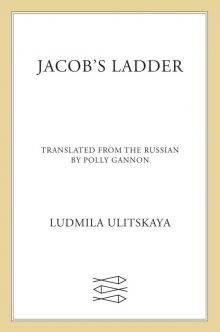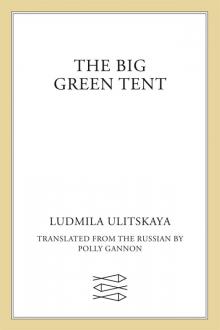- Home
- Ludmila Ulitskaya
Jacob's Ladder Page 2
Jacob's Ladder Read online
Page 2
Nora and her father moved the stiff body onto the table. It was not heavy. Her father went out to the kitchen to smoke. With a pair of scissors, Nora cut through the fabric of the ancient nightgown. It seemed to fall apart in her hands. Then she poured some cool water into a tub and started washing the body. It looked like a narrow boat and surprised her by its physical resemblance to her own: long, thin legs, the high arch of the feet, big toes extending beyond the line of the others, with nails long left unclipped, small breasts with their pink nipples, a long neck and narrow chin. The body looked younger than the face, its skin milky white and hairless.
Her father smoked in the huge communal kitchen crammed with small individual tables, one for each resident or family. Now and then, he went out to the corridor to talk on the ancient telephone, to inform the relatives. Nora picked up the strains of his mournful voice, repeating the same words over and over: “Mama died last night … I’ll call you about the funeral when I know more.”
When the body had been washed and rubbed dry with a torn duvet cover, Nora felt a stream of warm liquid running down her belly. It seemed to shock her awake—how could she have forgotten about Yurik? It was his milk flowing down, useless. She wanted to sit down on the divan, but she noticed that there was a damp spot on the sheet—the last juices and residues of the dead body. Nora ripped off that part of the sheet, crumpled it up, and threw it into the corner. She found another place for herself, in the armchair next to the window, where Grandmother used to sit and read those same books from the bookcase; she had never acquired any new ones for as long as Nora could remember. Under her breast, Nora placed a large mug with a broken handle—she remembered it well from childhood—and expressed milk until it filled the mug almost to the brim. She poured it out into the tub—impossible even to consider carrying those three hundred grams of milk home with her from here. She wiped off her chest with her T-shirt. Everything in the room seemed contaminated with death, including the hapless mug.
She got dressed again and went out into the corridor. Her father, wearing a woolen jacket and a hat, was smoking in the kitchen again. He had just returned from the polyclinic, which wasn’t far away, just over on the Arbat, with the required paperwork.
“I can’t get through to the crematorium; the line’s always busy. I’ll just go there myself. As soon as possible, I want to get all of this…” Here he made some vague circular gesture with his hand, which meant “over and done with.” And he went to make another phone call.
Then Nora dialed her own number. Taisia picked up immediately.
“Don’t you worry about a thing, Nora, honey. I’ve already called home. Sergei can manage on his own, and I can stay here till evening. Yurik’s fine; he’s fast asleep.”
Nora made her way over to the “closet”—a corner behind the buffet. All Grandmother’s things were hanging there on three hangers. What humble poverty: a winter coat with a shawl collar made of lambskin, worn threadbare in spots; a blue skirt and jacket, refashioned from a man’s suit; two blouses … Nora could remember each item from childhood. Judging by the cut, they were all from the late 1920s. Nora picked out the least shabby blouse. You could study the history of costume from these relics of the past. Traces of some pseudo-Egyptian motif were still visible on the sleeves.
The body had grown cool and stiff, like plaster, and she realized she would need to cut through the back of the blouse to get it on. She laid it out next to the body.
We’ll have to be careful moving her into the casket, Nora thought. But I’ll dress her now, so she’s not lying here naked.
Suddenly she felt that the room was cold. Wishing to dress Grandmother in something warmer, she took the jacket down off the hanger. She didn’t have to cut through the skirt—she pulled it up over the legs. Grandmother was a child of the Silver Age—its product and its victim. Two photographs, dusty with age, featuring a young beauty, hung above the piano. Lovely. She had been very lovely.
Nora dragged out a suitcase of old shoes that had been stuffed under the divan. They were now museum pieces—straps on leather buttons, goblet-shaped heels. Grandmother had worn these during the New Economic Policy period. Nora couldn’t put them on her grandmother’s stiff feet.
She did all of this as though she had been doing it every day of her life. In fact, it was the first time. Nora was only six when her other grandmother, Zinaida, had died, and she didn’t remember it. And she had hardly known her grandfathers. It was a matriarchal family. The only man was her father, Genrikh. Had he lived with them on Nikitsky Boulevard for a long time? Amalia had divorced him when Nora was thirteen.
It was too late now to mend things with Grandmother Marusya. It was too late to make peace with her. Now Nora was washing her, getting her dressed, and an old sense of irritation against the entire order of the world, against this awful shell of someone who had once been urgently, deeply loved by her, rose up from the depths of her being. A sarcophagus. Every dead body was a sarcophagus. You could stage a play in which every character occupies a sarcophagus. When they die, they stand up and step out of them. In that sense, everything alive is already dead. She would have to tell this to Tengiz.
Her milk started running again, forming a dark spot on her T-shirt. What captives of physiology they were—Grandmother Marusya had been the first to tell her this, of course. The biological tragedy of women … Her grandmother, the poor, timid fighter for women’s dignity, for justice. A Revolutionary. How frightened she was when Nora had been expelled from school. She refused to let her come home. So solemn and haughty. Then they had reconciled. But about three years later, they quarreled for good—like a black cat, the Soviet regime had run across their paths and come between them. And their mutual trust, their closeness, came to an end. And later there was Czechoslovakia … Now all she could do was smile about it. So silly.
Nora looked out the window. The glass was filthy; it hadn’t been washed in years. She saw gray snow outside the window, turning into gray rain. Why didn’t I do anything for her? How foolish I was to be angry at an old woman. I’m a heartless bitch.
But Nora had once loved her more than anyone on earth. Nearly every day after school, she rushed along the familiar route past the rerun movie theater, crossed the street by the Nikitsky Gates, then passed the Konservy store and ducked into a maze of small lanes—Merzlyakovsky, Skatertny, Khlebny, Skaryatinsky—to surface on Povarskaya Street by Grandmother’s house. And her heart skipped a beat when she ran up the stairs to the third floor and buried her nose in Grandmother’s tummy.
Still, how white her skin was. Her eyes were peeking out from under her eyelids and staring at Nora with indifference. Nora cut apart the back of the blouse and pulled one half of it on, beginning with the left arm, and the other half starting with the right. For the past twenty years, it seemed, Marusya had not brought home a single new object. Was it because of poverty? Or obstinacy? Or some sort of ineffable principle?
Someone tapped on the door timidly; it was her father, who had been afraid to see his mother naked. He walked in with a businesslike, satisfied expression on his face.
“Norka, I’ve ordered the casket. They’re delivering it tomorrow morning at ten. They didn’t even request a certificate. They just asked about the deceased’s measurements. I said she was five eight.”
“Five six,” Nora corrected him. “And don’t call me ‘Norka.’ My name is Nora. Your mother named me. Haven’t you read Ibsen?”
The sun peeked out for a moment, briefly illuminating the room so that the mother-of-pearl button under Grandmother’s chin gleamed; then the sun retreated again into the gray drizzle.
Nora tucked the jacket under either side of the body, after she had cut it through the back, as she had cut the blouse. The jacket, which had a round bronze brooch on the lapel, was the one Marusya had worn to meetings of some union or other, of journalists or of playwrights.
“Are you staying here overnight?” Nora asked her father.
“No, I have to go h
ome,” he said, alarmed. He hurried to add, “I’ll be here by nine tomorrow, though.” Then, hesitating, he said, “Will you come back to the apartment tomorrow, too, sweetie? I still have to go to the crematorium. I hope I can manage to do everything tomorrow.”
“It can wait until the day after tomorrow.”
“True, but I’d like to get it done as soon as possible. I’ll do my best. I’ll call you tonight.” Genrikh Yakovlevich had suddenly become a wonder of efficiency.
“I’ll be here at nine,” Nora said dryly, nodding. She felt she couldn’t leave her deceased grandmother alone for the night, but it was also unthinkable for her to stay here overnight with Yurik.
Nora went out into the corridor leading to the kitchen and walked down it, turning the two corners she had known since childhood. In the kitchen, Katya Firstonehere stood with her back to Nora, slicing something at the table, her elbows working energetically.
“Katya, we need to talk.”
Katya turned around, swiveling her entire torso. She had no neck to speak of: her head was planted directly on her shoulders.
“What’s wrong, Nyura?” This is what the charming idiot had called her her whole life.
“Will you sleep in Marusya’s room tonight?”
“Sleep there yourself, why don’t you? What are you asking me for?”
“I have a small baby; how can I manage it with him?”
“You had a baby?”
“Yes.”
“My Ninka had a baby, too! So Genrikh won’t stay overnight?”
“He has to hurry home. I’ll pay you.”
“Oh, I’ll take the buffet, then, Nyura. I like it.”
“Fine,” Nora agreed. “Take it. Only it won’t fit in your room.”
“Well, I’ll just move into her room, too. Nobody will refuse me. Ninka lives at her husband’s place, but she’s registered here.”
“All right, all right,” Nora said, nodding indifferently, imagining how Katya would rummage around in the room searching for loot.
“Ten rubles, Nyura! I can’t do it for less,” Katya said, though she winced at her own temerity.
“Ten—that’s for staying the night and for cleaning up,” Nora said, making sure.
That was how they left it.
The next day, Taisia volunteered to babysit Yurik again, so Nora didn’t have to worry about making other arrangements. She had two friends she could call on to help out—Natasha Vlasov and Marina Chipkovskaya, nicknamed Chipa—whom she had known since their years in theater school. They were both reliable, but Natasha had a five-year-old son, and Chipa worked three jobs to support her disabled mother and her younger sister.
Back in Grandmother’s room, she found several people: her father; Valera Bezborodko, his assistant; Katya and her daughter Ninka; their neighbor Raisa; and a woman from the Housing Management Committee, who wore a crooked red wig. The women were engaged in quiet but lively conversation. Nora guessed they were deliberating material, as opposed to spiritual, matters.
“It’s sad about Marusya,” Raisa said, with a subtle shake of her head. “For fifty years, we lived side by side like this, with only a wall between us. I’ve never said a bad word about her in my entire life … I’d just like to have … to remember her by…”
“Raisa, what did you say you wanted?” Genrikh said abruptly, in an unexpectedly sharp tone.
“No, no, never mind, Genrikh. I’m just saying that for fifty years we lived here, you might say, soul to soul, heart to heart…” And she backed toward the door.
The vultures are already here, thought Nora, and sent them all out the door, one by one. Her father looked at her gratefully. He had lived in this apartment as a child, and he had known these old women when they were still in the prime of life, but he had still not learned how to talk to them. He was never consistent, either speaking down to them or trying to ingratiate himself. Nora knew that he was unable to deal with people as equals. There was always a ladder—higher, lower … Poor guy, she thought. She felt sorry for her father, even a certain warmth. And he understood, and put his hand on her shoulder. Awkwardly. In Nora’s earliest years, he believed that, merely because she was his daughter, he was superior to her. He spoke commandingly to her, issued orders. Then she grew up and put everything in its proper place. She was about eighteen when she visited him in his new home, with his new family. He took her aside and began reproaching her for visiting so infrequently, saying that it was, no doubt, the influence of her mother, who didn’t want them to spend time together. Nora cut him off: “Dad, can you really not understand that if Mama didn’t want me to, I wouldn’t come? She just doesn’t care, one way or another.” After that, he never tried to lord it over her again.
They delivered the casket at ten. Two undertakers, working with consummate skill, placed the casket on the table next to the deceased. Deftly, even artfully, they lifted the body up and dropped it gently into the casket, where it landed in just the right place with a hollow thud. Her father went out of the room with the undertakers, leaving Nora alone. He paid them their fees in the corridor, at the door, and Nora heard them thanking him. Her father had no doubt given them more than they expected.
The flaps of the garments she had cut through the back had shifted and come apart, and Nora tucked them in on either side of the body again. She combed her grandmother’s wispy gray hair and parted it the way she liked it, then gathered up the loose strands and pulled them to the back. She admired her grandmother’s slightly sloping forehead and elongated eyelids. Her grandmother’s silhouette was defined by several basic lines—the outline of her cheekbones, the transition from her neck to her shoulder, the line that ran from the knees to her toes. Nora even had the urge to pick up a pencil to sketch her. The deceased seemed to have grown more attractive overnight. Her face could not have been described as pretty; rather, it was beautiful, slender and luminous, and the excess aging skin that had hung down under her chin had melted away. She had become more youthful. Too bad Nora’s own face hadn’t turned out to resemble her grandmother’s.
“Nora, the neighbors are saying that we should organize a meal … There should be a funeral repast.” Her father looked at her expectantly.
Nora thought for a moment. Grandmother had objected to having neighbors barge into her room her whole life. It didn’t make any difference now, though.
“Tell Katya to set the table, and give her some money for shopping. Have her set it up in the kitchen. But don’t let her buy a lot of vodka, or she’ll drink too much. We can’t not have a repast, of course…”
Her father agreed. “Before the war, there weren’t as many tables in the kitchen. We always set the table there. There were a lot of old men here back then. They’re all dead now, of course. But I never went to the wakes, and Mama didn’t go, either. Strange as it may seem, my father was the one who attended them.”
This was one of the first times Genrikh had ever mentioned his father. Nora noted this with surprise. In fact, no one had ever told her anything about Jacob Ossetsky. He was just a hazy recollection from childhood. She did remember him, though: he had been at their house on Nikitsky Boulevard once. A few traces remained in her memory—a bushy mustache, long, large ears, and a self-fashioned crutch made from a single piece of wood, with a crook in the branch that served as a handgrip. She never saw him again after that.
Her father went to find the recently banished Katya. She was glad to be charged with the task, and glad about the money, and said that she would go to the store and buy everything. Nora’s father nodded in assent. It was all the same to him, but to Katya it was an exciting prospect. Nora and Katya left at almost the same time, one to the florist’s on the Arbat, the other in the direction of Revolution Square. Katya was happy. She had money, an amount that was one and a half times her monthly wages, and she was estimating how to cut down on the cost of the necessary purchases so there would be something left over.
In the florist’s on the Arbat, Nora came across something th
at filled her with wonder: enormous hyacinths, a whole bucketful of them, which she was seeing for the first time. She bought all of them—the lilac-blue ones, and the white, and the rosy pink. She spent all the cash she had. They wrapped the flowers in multiple layers of newsprint, and even threw in the bucket for good measure.
Lugging the garden bucket, she walked along a short stretch of Trubnikovsky Lane. Then she crossed Novy Arbat, and again found herself on Trubnikovsky, now on the longer section of it. It was drizzling—rain or snow, she couldn’t distinguish. The light was pearly gray; the bucket was heavy. Her boots were completely soaked through, and her milk had already started up. But she had stuffed folded diapers into her bra, and on top of this layer of rigging she had bound an old kerchief. Early in the morning, Taisia had kicked up a fuss, demanding that Nora bind up her breasts and threatening that if she refused, Taisia would put her foot down and forbid her to go to the funeral. Nora had laughed and complied.
She arrived back at her grandmother’s apartment at the same time as the hearse. She went upstairs first, ahead of the undertakers. A few downcast figures, distant relatives, were standing around. One or two vaguely familiar people came up to Nora and her father and kissed them, uttering stock phrases, with varying degrees of warmth. One tiny elderly woman in a white scarf and beret wept silently; someone in the corner offered her a few drops of valerian in Grandmother’s “medicine glass,” to soothe her. Nora didn’t recognize the woman.
Nora threw the flowers into the casket. There was no need to arrange them in any special way—the flowers had their own magic, which transformed everything around them. The paucity of the surroundings acquired splendor, like Cinderella. It nearly took Nora’s breath away—Nora, a professional with years of experience in theater set design, whose mastery consisted in transforming the stage through artifice. It was like the magic lantern that had been used long ago in The Blue Bird at the Moscow Art Theatre, in the scene when Tyltyl and Mytyl arrive in the land of the dead to find their grandmother and grandfather. Of course, it had been Marusya who took her, when she was five years old, to see this play. It seemed to Nora that she could discern, in the thin strip between Marusya’s imperfectly closed eyelids, sympathy and approval. The hyacinths possessed some sort of uncanny power. They filled the room with their pungent scent, overwhelming the smell of her grandmother’s eau de cologne, and the dust, and the valerian. Nora even felt that, with just one touch of a magic wand, this room would become a palace, and her poor grandmother, with her large ambitions, would become what she had always wanted, but was unable, to be …

 Jacob's Ladder
Jacob's Ladder Life Stories
Life Stories The Funeral Party
The Funeral Party Medea and Her Children
Medea and Her Children The Big Green Tent
The Big Green Tent